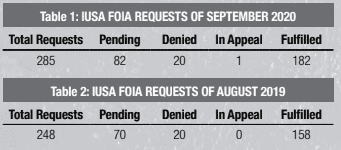by Ashley Sanislo Casey, Director of Education & Professional Development, IIUSA
 In recent previous editions of the Regional Center Business Journal, I have written about IIUSA’s ongoing efforts to collect important EB-5 industry data through Freedom of Information Act (FOIA) requests and the subsequent frustration with the lack of timely response or of relevant information resulting from those requests. To quickly summarize, IIUSA relies on FOIA requests to gather information from the federal government that in turn helps us inform our members of industry trends and to create and update pertinent resources for our members’ business development. These resources include, but are certainly not limited to, I-526 and I-829 data reports, economic impact reports and interactive tools on iiusa.org like our TEA map and Investor Markets Portal. Without information through FOIA, these tools and resources would be impossible to create.
In recent previous editions of the Regional Center Business Journal, I have written about IIUSA’s ongoing efforts to collect important EB-5 industry data through Freedom of Information Act (FOIA) requests and the subsequent frustration with the lack of timely response or of relevant information resulting from those requests. To quickly summarize, IIUSA relies on FOIA requests to gather information from the federal government that in turn helps us inform our members of industry trends and to create and update pertinent resources for our members’ business development. These resources include, but are certainly not limited to, I-526 and I-829 data reports, economic impact reports and interactive tools on iiusa.org like our TEA map and Investor Markets Portal. Without information through FOIA, these tools and resources would be impossible to create.
The problem is, in recent years, the response time between when we submit a request to U.S. Citizenship & Immigration Services (USCIS) to when we receive a response that includes the data we requested has become untenable. The table below demonstrates the backlog we are experiencing in getting responses to our requests. Additionally, it is important to note that we have requests pending that are over three years old.
In the 12 months since the last article on FOIA, we have submitted an additional 37 requests and our pending cases increased from 70 to 82. In that same time period, we received 24 responses, moving our fulfilled cases to 182.
FOIA statute states that the agency to which a request is sent has 20 business days to provide a response. Towards the end of 2019, we decided it was time to take a more active approach in compelling USCIS to provide information in a more reasonable time frame. We filed lawsuits in the US District Court for the District of Columbia, citing USCIS’s failure to meet the standards of the FOIA statute that require the agency to reply within 20 days of receipt of our request.
CONTINUE READING









